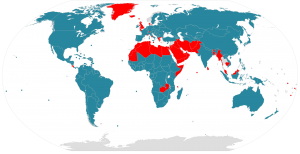Introduction
There is no questioning that countries implementing secularism and providing an equal approach to people from all religions or non-religious people have more chance to become democratic. There is no doubt that almost all democratic countries in the world somehow implement a secular regime. However, many of these countries do not specifically mention secularism or laicism in their constitutions. In fact, there are few countries in the world that specifically put secularism or laicism into their constitutions in order to show high correlation between secularism and democracy. In this piece, I am going to first define secularism and laicism and then focus on different constitutions in the world and give you examples from countries that put secularism or laicism as a guiding principle into their constitutions.
Secularism vs Laicism: A Short Definition
Secularism as a dictionary definition (according to Merriam-Webster Dictionary) means “indifference to or rejection or exclusion of religion and religious considerations”.[1] Cambridge Dictionary on the other hand defines secularism as “the belief that religion should not be involved with the ordinary social and political activities of a country”.[2] Britannica also focuses on exclusion of religion and defines it as “any movement in society directed away from otherworldliness to life on earth”.[3]
While secularism is mostly defined as a general principle about behaving in an unreligious manner, laicism or “laïcité” is more about state principles. According to Merriam-Webster Dictionary, laicism is “a political system characterized by the exclusion of ecclesiastical control and influence”.[4] For Collins Dictionary, laicism is nothing but “policy and principles opposing clericalism and restricting political influence and power to the laity”.[5]
So, in short, while secularism points out a broader separation between the earthly and unearthly thinking, laicism focuses on state’s principles and policies not based on any particular religion or sect.
Countries Having Secularism or Laicism Principle in Their Constitutions
There are very few countries in the world that specifically put secularism or laicism into their constitutions. This does not mean that other countries are not secular; rather, they do not openly state this in their constitution and make partial or full reference to their official religion (whether it would be Islam, Christianity, Judaism or other religious beliefs). In fact, most of the countries in the world are now considered as secular. However, we should underline that putting secularism or laicism into constitution specifically shows how it is important for this country or as in the case of Turkey, how it should be kept very carefully due to religious fundamentalist movements.

Countries in the world according to their secularization level[6]
Blue: States with no official religion
Red: States with official religion
Gray: Ambiguous states
Among the countries that put secularism into their constitution, most famous one is for sure France. The Article 1 of the France’s 1958 constitution states that France is a secular country.[7] France in fact could be labelled as secularism’s motherland and a model country for the rest of the world in terms of secularization. France became a secular country after the famous French Revolution of 1789 and the powers possessed by the Catholic Church were lifted. Modern day French secularism is based on “The Law of 1905”.[8]
Another important country in terms of secularism is Turkey. In order to get distanced from its Islamic imperial past, the new Republican Turkey entered into a big transformation period in the 1920s and 1930s under the leadership of its founder and first President of the Republic Mustafa Kemal Atatürk. However, unlike what is widely claimed, Atatürk did not establish the Republic of Turkey (Türkiye) as a secular state. 1921 and 1924 constitutions both carried an article stating that “the official religion is Islam”. However, Atatürk removed this clause in 1928 and added secularism as a constitutional principle in 1937. Thus, we can claim that Turkey became a secular country in 1928. Turkey’s subsequent constitutions (1961 and the current – 1982) also kept secularism clause. Current Turkish constitution states that “The Republic of Türkiye is a democratic, secular and social state governed by rule of law, within the notions of public peace, national solidarity and justice, respecting human rights, loyal to the nationalism of Atatürk, and based on the fundamental tenets set forth in the preamble.”[9]
The Republic of Azerbaijan is also a secular state and it mentions this in its constitution. Article 7 of the Azerbaijani constitution is as follows: “The state of Azerbaijan is a democratic, law-governed, secular, unitary republic”[10] Kazakhstan is another Turkic state mentioning secularism as state principle in the constitution. Article 1 of the Kazakh constitution states; “The Republic of Kazakhstan proclaims itself democratic, secular, legal and social state whose highest values are an individual, his life, rights and freedoms.”[11] Similarly, Kyrgyz Republic or Kyrgyzstan is also a secular Turkic state and it mentions this preference in its constitution.[12] In addition, Turkmenistan also mentions secularism in its constitution.[13] Although its recognition is limited to Turkey, Turkish Republic of Northern Cyprus (TRNC) is also a secular state similar to Turkey. Article 1 of the TRNC constitution is as follows: “The Turkish Republic of Northern Cyprus is a secular republic based on the principles of democracy, social justice and the supremacy of law.”[14] In that sense, except Uzbekistan (which is a secular state too), all Turkic states possess constitutions mentioning secularism as a state principle.
Mexico is another country that gives utmost importance to secularism and writes it separately to its constitution. According to Article 40 of the Mexican constitution, “It is in the will of the Mexican people to constitute into a representative, democratic, secular, federal, Republic, made up by free and sovereign States in everything related to its domestic regime, but united in a federation established according to the principles of this fundamental law.”[15]
Russian Federation is also a secular state stating it in its constitution. As the inheritor of USSR, Russia kept secularism as a state principle by the Article 14 of its constitution stating that “The Russian Federation is a secular state. No religion may be established as a state or obligatory one. Religious associations shall be separated from the State and shall be equal before the law.”[16]
Serbia is a secular state that adopts secularism as a constitutional principle too. Article 11 of the Serbian constitution states that “The Republic of Serbia is a secular state. Churches and religious communities shall be separated from the state. No religion may be established as state or mandatory religion.”[17]
India is another secular state which mentions secularism in its constitution. Secularism is mentioned both in the Preamble part and in the Article 25 about the freedom of religion.
Nepal is also a secular state that prioritizes secularism and mentions it specifically in its constitution. Article 4 of the Nepali constitution states that “Nepal is an independent, indivisible, sovereign, secular, inclusive democratic, socialism-oriented federal democratic republican state.”[18]
Kosovo is also a secular state and the article 8 of the Kosovan constitution states that “The Republic of Kosovo is a secular state and is neutral in matters of religious beliefs.”[19]
In addition, although many internet sources point out Portugal, Japan and South Korea as countries having written secularism as constitutional principle, these states are secular but do not specifically mention of secularism in their constitutions.
Conclusion
The effect of religion has been in decline for many centuries. However, religions will continue to play an important role in our lives. Major religions even survived during the age of communism when almost half of the world adopted atheism as state policy. That is why, countries must learn how to deal with religious groups and to adopt secular policies to protect their neutrality. In the case of Muslim countries, it is even more important since Muslim nations have broader problems of secularization compared to Christians. In addition, we should understand that secularism does not automatically lead to atheism or agnosticism, and it protects the rights of religious people too. Last word, secularism and democracy should go hand in hand to create a modern country but you cannot achieve these two ideals without creating a developed and dynamic market economy.
Cover Photo: Turkey’s founding leader Mustafa Kemal Atatürk praying during the National Struggle
Assoc. Prof. Ozan ÖRMECİ
[1] Merriam-Webster Dictionary, “secularism”, Date of Accession: 02.01.2023 from https://www.merriam-webster.com/dictionary/secularism.
[2] Cambridge Dictionary, “secularism”, Date of Accession: 02.01.2023 from https://dictionary.cambridge.org/dictionary/english/secularism.
[3] Britannica, “secularism”, Date of Accession: 02.01.2023 from https://www.britannica.com/topic/secularism.
[4] Merriam-Webster Dictionary, “laicism”, Date of Accession: 02.01.2023 from https://www.merriam-webster.com/dictionary/laicism#:~:text=%3A%20a%20political%20system%20characterized%20by%20the%20exclusion%20of%20ecclesiastical%20control%20and%20influence.
[5] Collins Dictionary, “laicism”, Date of Accession: 02.01.2023 from https://www.collinsdictionary.com/dictionary/english/laicism.
[6] Wikipedia, “Secular state”, Date of Accession: 02.01.2023 from https://en.wikipedia.org/wiki/Secular_state.
[7] “Constitution of October 4, 1958”, Date of Accession: 02.01.2023 from https://www.conseil-constitutionnel.fr/sites/default/files/as/root/bank_mm/anglais/constiution_anglais_oct2009.pdf.
[8] “Loi du 9 décembre 1905 concernant la séparation des Eglises et de l’Etat.”, Date of Accession: 02.01.2023 from https://www.legifrance.gouv.fr/loda/id/JORFTEXT000000508749.
[9] “Constitution of the Republic of Türkiye & Rules of Procedure of the Grand National Assembly of Türkiye”, Date of Accession: 02.01.2023 from https://www5.tbmm.gov.tr/yayinlar/2021/TC_Anayasasi_ve_TBMM_Ic_Tuzugu_Ingilizce.pdf.
[10] “The Constitution of the Republic of Azerbaijan”, Date of Accession: 02.01.2023 from http://ask.org.az/wp-content/uploads/2019/10/Konstitusiya_ENG.pdf.
[11] “Kazakhstan’s Constitution of 1995 with Amendments through 2017”, Date of Accession: 02.01.2023 from https://www.constituteproject.org/constitution/Kazakhstan_2017.pdf?lang=en.
[12] “Constitution of the Kyrgyz Republic”, Date of Accession: 02.01.2023 from https://www.ilo.org/dyn/natlex/docs/electronic/87546/99880/f1398573553/kgz87546.pdf.
[13] “Turkmenistan’s Constitution of 2008 with Amendments through 2016”, Date of Accession: 02.01.2023 from https://constituteproject.org/constitution/Turkmenistan_2016.pdf?lang=en.
[14] “The Constitution of the Turkish Republic of Northern Cyprus”, Date of Accession: 02.01.2023 from https://ombudsman.gov.ct.tr/Portals/20/Constitution%20of%20TRNC.pdf.
[15] “Mexico’s Constitution of 1917 with Amendments through 2015”, Date of Accession: 02.01.2023 from https://www.constituteproject.org/constitution/Mexico_2015.pdf?lang=en.
[16] “The Constitution of the Russian Federation”, Date of Accession: 02.01.2023 from http://www.constitution.ru/en/10003000-02.htm.
[17] “Constitution of The Republic of Serbia”, Date of Accession: 02.01.2023 from https://www.ilo.org/dyn/natlex/docs/ELECTRONIC/74694/119555/F838981147/SRB74694%20Eng.pdf.
[18] “Nepal’s Constitution of 2015”, Date of Accession: 02.01.2023 from https://www.constituteproject.org/constitution/Nepal_2015.pdf.
[19] “Kosovo’s Constitution of 2008 with Amendments through 2016”, Date of Accession: 02.01.2023 from https://www.constituteproject.org/constitution/Kosovo_2016.pdf?lang=en.

























































